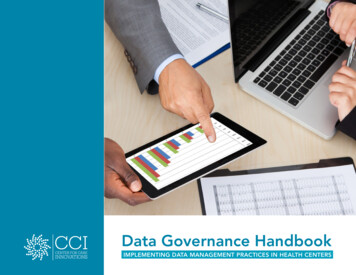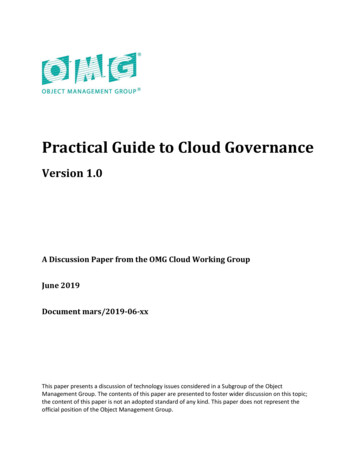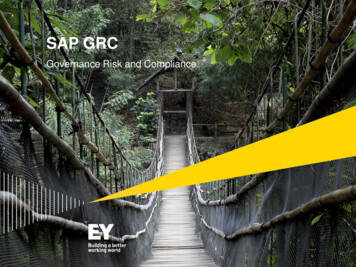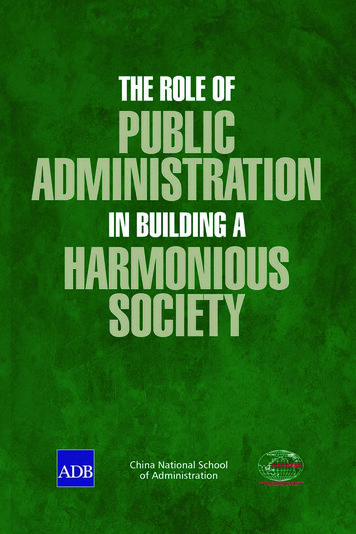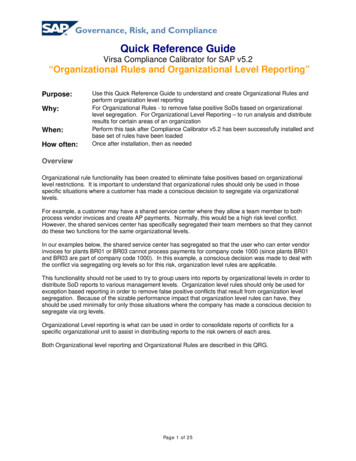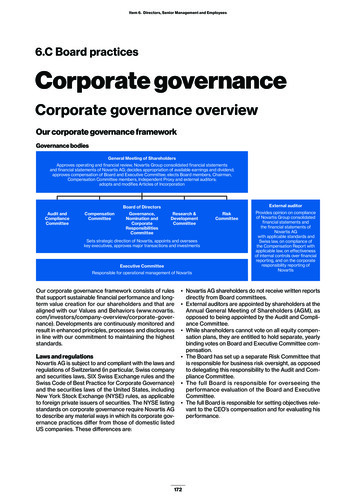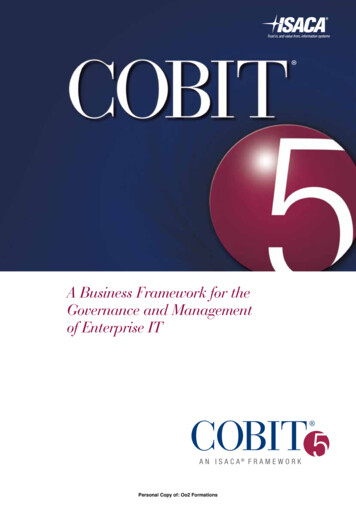
Transcription
Committee of Experts on Public AdministrationHelping countries build strong institutionsfor achievement of the SDGsPrinciples ofEffectiveGovernance forSustainableDevelopment
Principlesof EffectiveGovernancefor SustainableDevelopmentWhy do we need these principles?Institutions play a crucial role in theachievement of all Sustainable DevelopmentGoals (SDGs) and targets. But public sectorreforms needed to achieve the SDGs remain amajor challenge in many countries.In order to address this challengeconcretely, the Committee of Expertson Public Administration (CEPA) hasdeveloped a set of principles of effectivegovernance for sustainable development.The essential purpose of these voluntaryprinciples is to provide practical, expertguidance to interested countries in abroad range of governance challengesassociated with implementation of the2030 Agenda for Sustainable Development.
The 11 principles, endorsed by theEconomic and Social Council in July 2018,highlight the need for pragmatic and ongoingimprovements in national and local governancecapabilities to reach the SDGs. To this end, theprinciples are linked to a variety of commonlyused strategies for operationalizing responsiveand effective governance.Applying the principles and associatedstrategies to all public institutions canaccelerate efforts to strengthen nationaland local governance capacities to achievethe 2030 Agenda and other internationalagreements.How can they be of benefit?The principles are designed to:»»Help interested countries, on a voluntarybasis, build effective, accountable andinclusive institutions at all levels, witha view to achieving the shared visionfor people and planet embodied in the2030 Agenda»»Support countries in operationalizing theinstitutional aspects of SDG 16 throughconcrete strategies
»»Promote mainstreaming of effectivegovernance in SDG implementation anddevelopment plans and programmes atall levels»»Engage the relevant United Nationsorganizations, regional organizations andprofessional and academic communities,in an inclusive manner, together with allrelevant stakeholders»»Bring together proven standards andoperational guidelines in all areas of publicsector institution-building relevant toSDG implementation»»Provide a baseline for policymakingwhile strengthening evidence-based andaction-oriented implementation of andfollow-up to the 2030 Agenda
Principles of Effective Governance for Sustainable DevelopmentThe11 principlesThere are 11 principles of effectivegovernance for sustainable developmentendorsed by ECOSOC. They are linkedto 62 commonly used strategies foroperationalizing responsive and effectivegovernance. Many of these strategieshave been recog nized and endorsedover the years in various United Nationsforums, resolutions and treaties.
The first threeprinciplesfocus oneffectivenessUN Photo / Laura Jarriel
Principles of Effective Governance for Sustainable DevelopmentCompetenceTo perform their functions effectively,institutions are to have sufficientexpertise, resources and tools to dealadequately with the mandates undertheir authorityCommonly used strategies to operationalize thisprinciple include the promotion of a professionalpublic sector workforce, strategic human resourcesmanagement, leadership development and trainingof civil servants, performance management, resultsbased management, financial management andcontrol, efficient and fair revenue administration andinvestment in e-government.1Principle
Principles of Effective Governance for Sustainable DevelopmentSoundpolicymakingTo achieve their intended results, publicpolicies are to be coherent with oneanother and founded on true or wellestablished grounds, in full accordancewith fact, reason and good senseCommonly used strategies include strategicplanning and foresight, regulatory impact analysis,promotion of coherent policymaking, strengtheningnational statistical systems, monitoring andevaluation systems, science-policy interface,risk management frameworks and data sharing.2Principle
Principles of Effective Governance for Sustainable DevelopmentCollaborationTo address problems of common interest,institutions at all levels of governmentand in all sectors should work togetherand jointly with non-State actors towardsthe same end, purpose and effectCommonly used strategies include centre ofgovernment coordination under the Head of Stateor Government, collaboration, coordination,integration and dialogue across levels of governmentand functional areas, raising awareness of theSustainable Development Goals, network-basedgovernance and multi-stakeholder partnerships.3Principle
Three moreprinciplesaddressaccountabilityPhoto: UNICEF/UN063424/Schermbrucker
Principles of Effective Governance for Sustainable DevelopmentIntegrityTo serve in the public interest,civil servants are to discharge theirofficial duties honestly, fairly and in amanner consistent with soundness ofmoral principleCommonly used strategies include the promotionof anti-corruption policies, practices and bodies,codes of conduct for public officials, competitive public procurement, elimination of bribery andtrading in influence, conflict of interest policies,whistle-blower protection and provision ofadequate remuneration and equitable pay scalesfor public servants.4Principle
Principles of Effective Governance for Sustainable DevelopmentTransparencyTo ensure accountability and enablepublic scrutiny, institutions are to beopen and candid in the e xecution oftheir functions and promote access toinformation, subject only to the specificand limited exceptions as are providedby lawCommonly used strategies include proactive disclosure of information, budget transparency,open government data, registries of beneficialownership and lobby registries.5Principle
Principles of Effective Governance for Sustainable DevelopmentIndependentoversightTo retain trust in government, oversightagencies are to act according to strictlyprofessional considerations and apartfrom and unaffected by othersCommonly used strategies include promotion of theindependence of regulatory agencies, arrangementsfor review of administrative decisions by courtsor other bodies, independent audit and respectfor legality.6Principle
Photo: UNICEF/UN0311775/KokicFive principlesfocus oninclusiveness
Principles of Effective Governance for Sustainable DevelopmentLeavingno one behindTo ensure that all human beings canfulfil their potential in dignity andequality, public policies are to take intoaccount the needs and aspirations ofall segments of society, including thepoorest and most vulnerable and thosesubject to discriminationCommonly used strategies include the promotion ofequitable fiscal and monetary policy, promotion ofsocial equity, data disaggregation, and systematicfollow-up and review.7Principle
Principles of Effective Governance for Sustainable DevelopmentNon-discriminationTo respect, protect and promote humanrights and fundamental freedoms forall, access to public service is to beprovided on general terms of equality,without distinction of any kind as to race,colour, sex, language, religion, politicalor other opinion, national or social origin,property, birth, disability or other statusCommonly used strategies include the promotionof public sector workforce diversity, prohibition ofdiscrimination in public service delivery, multilingualservice delivery, accessibility standards, culturalaudit of institutions, universal birth registration andgender-responsive budgeting.8Principle
Principles of Effective Governance for Sustainable DevelopmentParticipationTo have an effective State, allsignificant political groups should beactively involved in matters that directlyaffect them and have a chance toinfluence policyCommonly used strategies include free and fairelections, regulatory process of public consultation,multi-stakeholder forums, participatory budgetingand community-driven development.9Principle
Principles of Effective Governance for Sustainable DevelopmentSubsidiarityTo promote government that isresponsive to the needs and aspirationsof all people, central authorities shouldperform only those tasks which cannotbe performed effectively at a moreintermediate or local levelCommonly used strategies include fiscal federalism,strengthening urban governance, strengtheningmunicipal finance and local finance systems,enhancement of local capacity for prevention,adaptation and mitigation of external shocks, andmultilevel governance.10Principle
Principles of Effective Governance for Sustainable DevelopmentIntergenerationalequityTo promote prosperity and quality oflife for all, institutions should constructadministrative acts that balance theshort-term needs of today’s generationwith the longer-term needsof future generationsCommonly used strategies include sustainabledevelopment impact assessment, long-termpublic debt management, long-term territorialplanning and spatial development, andecosystem management.11Principle
Committee of Expertson Public Administration
About CEPAThe Committee of Experts on PublicAdministration is an expert body of theUnited Nations that studies and makesrecommendations to improve governance andpublic administration structures and processesfor development. It assists the Economicand Social Council by reviewing trends,issues and priorities in public administration,notably in relation to the 2030 Agenda forSustainable Development and in support of theimplementation and progress reviews of theSustainable Development Goals.The Committee is comprised of 24 experts whoserve in their personal capacity. The expertsare nominated by the Secretary-General, inconsultation with Member States, and approvedby the Council. The membership is drawn fromthe interrelated fields of public economics,public administration, and public finance andreflects geographical and gender balance.The term of office is four years.
Main activities of the CommitteeAn informal working group will continue toidentify and review related technical guidelinesto operationalize the principles in collaborationwith relevant United Nations organizations,regional organizations and professional andacademic communities in an inclusive manner.The working group is supported in theseefforts by the Division for Public Institutionsand Digital Government in the United NationsDepartment of Economic and Social Affairs.The informal working group is also involved inassociating global SDG indicators with eachof the principles to strengthen the analyticalbasis for assessing the impact of reformpolicies on building effective, accountableand inclusive institutions at all levels.CEPA is collaborating with the Praia Group onGovernance Statistics of the United NationsStatistical Commission on indicators.The CEPA working group is also engagingwith the International Organization ofSupreme Audit Organizations DevelopmentInitiative to provide input into a future auditmodel of implementation of the SustainableDevelopment Goals.
Key milestonesApril 2016CEPA introduces the idea ofdeveloping principles to address needsof 2030 AgendaApril 2018Principles of effective governance forsustainable development adopted by CEPAJuly 2018ECOSOC endorses the principlesSeptember 2018Informal CEPA working groupconvened to carry activity forwardApril 2019CEPA discusses possible linksto global SDG indicatorsOctober 2019UN DESA-AU/APRM regional workshopon moving from principles to practiceJuly 2021Target date for completion of guidanceon strategies and indicators
19-00103 GDUOctober 2019To learn more about the principles and how theycan be used to help build strong institutions forachievement of the Sustainable Development Goals,please contact:Secretariat of the Committee of Experts on Public AdministrationDivision for Public Institutions and Digital GovernmentUnited Nations Department of Economic and Social Affairs2 UN Plaza, Room DC2-1729New York, NY 10017United Statesdpidg@un.org 1 212 a
used strategies for operationalizing responsive and effective governance. . serve in their personal capacity. The experts are nominated by the Secretary-General, in consultation with Member States, and approved . a



